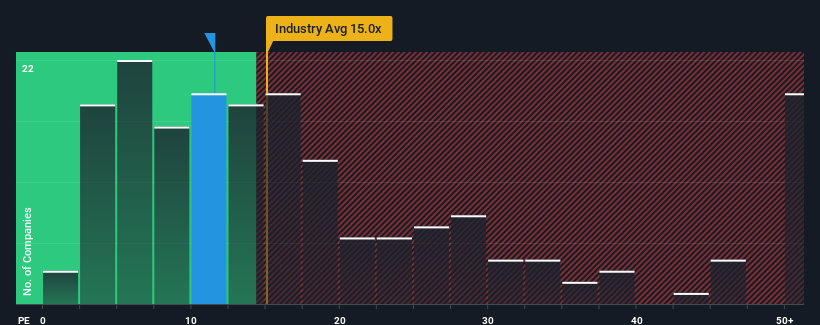
With a price-to-earnings (or "P/E") ratio of 11.5x Acom Co., Ltd. (TSE:8572) may be sending bullish signals at the moment, given that almost half of all companies in Japan have P/E ratios greater than 15x and even P/E's higher than 24x are not unusual. However, the P/E might be low for a reason and it requires further investigation to determine if it's justified.
While the market has experienced earnings growth lately, Acom's earnings have gone into reverse gear, which is not great. It seems that many are expecting the dour earnings performance to persist, which has repressed the P/E. If this is the case, then existing shareholders will probably struggle to get excited about the future direction of the share price.
See our latest analysis for Acom

How Is Acom's Growth Trending?
There's an inherent assumption that a company should underperform the market for P/E ratios like Acom's to be considered reasonable.
If we review the last year of earnings, dishearteningly the company's profits fell to the tune of 2.1%. This means it has also seen a slide in earnings over the longer-term as EPS is down 14% in total over the last three years. Accordingly, shareholders would have felt downbeat about the medium-term rates of earnings growth.
Looking ahead now, EPS is anticipated to slump, contracting by 13% during the coming year according to the dual analysts following the company. Meanwhile, the broader market is forecast to expand by 11%, which paints a poor picture.
With this information, we are not surprised that Acom is trading at a P/E lower than the market. However, shrinking earnings are unlikely to lead to a stable P/E over the longer term. There's potential for the P/E to fall to even lower levels if the company doesn't improve its profitability.
What We Can Learn From Acom's P/E?
Generally, our preference is to limit the use of the price-to-earnings ratio to establishing what the market thinks about the overall health of a company.
As we suspected, our examination of Acom's analyst forecasts revealed that its outlook for shrinking earnings is contributing to its low P/E. At this stage investors feel the potential for an improvement in earnings isn't great enough to justify a higher P/E ratio. It's hard to see the share price rising strongly in the near future under these circumstances.
You need to take note of risks, for example - Acom has 2 warning signs (and 1 which is concerning) we think you should know about.
It's important to make sure you look for a great company, not just the first idea you come across. So take a peek at this free list of interesting companies with strong recent earnings growth (and a low P/E).
New: Manage All Your Stock Portfolios in One Place
We've created the ultimate portfolio companion for stock investors, and it's free.
• Connect an unlimited number of Portfolios and see your total in one currency
• Be alerted to new Warning Signs or Risks via email or mobile
• Track the Fair Value of your stocks
Have feedback on this article? Concerned about the content? Get in touch with us directly. Alternatively, email editorial-team (at) simplywallst.com.
This article by Simply Wall St is general in nature. We provide commentary based on historical data and analyst forecasts only using an unbiased methodology and our articles are not intended to be financial advice. It does not constitute a recommendation to buy or sell any stock, and does not take account of your objectives, or your financial situation. We aim to bring you long-term focused analysis driven by fundamental data. Note that our analysis may not factor in the latest price-sensitive company announcements or qualitative material. Simply Wall St has no position in any stocks mentioned.
About TSE:8572
Acom
Offers loans, credit cards, and loan guarantee services in Japan and internationally.
Reasonable growth potential with adequate balance sheet.
Market Insights
Community Narratives




